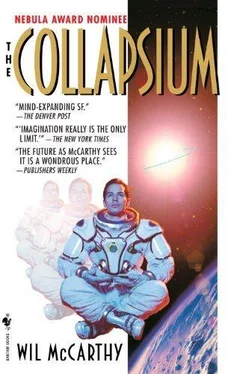“I’m not saying this very well. It’s a straightforward thing, though: I want to change, not what I am but what I do with what I am. Surely it behooves us, as immortal people, to find the time to start over. Otherwise, we’re just living the same time, over and over again.”
“There is the small matter,” Bruno reminded her, “of rescuing the sun from collapse.” He was suddenly cross, and hadn’t the energy to conceal it.
“Oh,” she said, seeming to come awake. “Yes, there is that.” Then she frowned, not at Bruno but at herself. “Here I’m blithely assuming you’ve figured it all out. You must get so tired of that! To be so relentlessly relied upon, when inside you’re just like everyone else. Smarter, obviously, but there are lots of smart people who don’t get… I don’t know… scapegoated that way. Even myself, who should have known better than to let this all happen.”
Bruno nodded, somewhat mollified. “To be relied upon, yes. It’s burdensome. Maybe that’s why I left.”
“Hmm. I never thought of it that way. I suppose you probably have a lot to say on that subject.”
“Er,” he hedged, not wanting to be drawn in again. “Perhaps a little later.”
“Oh.” Deliah, who’d had some small experience dealing with physicists, smiled a little and clapped him on the arm. “You’ve started working. I wasn’t disturbing you before, but I am now.”
That only made him feel sheepish. “It’s not that I don’t want to talk, Deliah. I do. It’s very rude, I know.”
“Can I help with what you’re doing?”
Bruno thought about that. “You probably could, if we had more time. A week, perhaps. But I’m too many layers deep, in matters I’d be very poor at explaining. As the designated scapegoat, I need to press on with this alone.”
She nodded. “I understand.”
“I suppose you do,” he said sincerely, “and I appreciate it. It’s quite uncommon.”
He turned back to his analyses.
As often happened when he was engaged in such activity, time passed. Quite a lot of it, actually, until Deliah became restless and—against all advice—unstrapped herself to “stretch her legs.” This involved her pacing back and forth in the cabin’s quite narrow confines, which of course Bruno found very distracting, and couldn’t quite keep himself from complaining about.
“Well,” Deliah said, trying to be polite but with frustration and boredom written all over her, “I appreciate the rescue; I really do. But it’s difficult to lie still on a couch for sixteen hours with no one to talk to and nothing to do. Sixteen hours is splendidly fast for such a monumental journey—five hundred light minutes, almost sixty AU. And I thought / was moving fast, covering that same distance in a week! But I’m a person who needs to be busy. With the Iscog down, I can’t access libraries or entertainments or anything, and with you and this ‘Muddy’ down I can’t have a conversation…” She looked around the cabin, her eyes settling on Hugo. “What’s this thing? A servant?”
“Oh, uh, actually a sort of pet,” Bruno answered distractedly.
“Mewl,” Hugo answered, as if aware of the attention.
“May I release it?”
“What? Er, I’d rather you didn’t. It tends to get into trouble, which under present circumstances hardly seems a good idea. It seems content enough where it is, yes?”
Deliah sighed. “The perfect pet for you, Declarant; it requires no attention. Shall I redecorate the cabin, here? It’s really… Well, I guess ‘spartan’ is hardly the word for something done up in gold and lapis lazuli, but it’s not very pleasing . You’re hoping to rescue Her Majesty in this? It ought to be more regal, then.”
Hrumph. Her Majesty could be rescued in a clear plastic bag for all Bruno cared. Still it might be nice to surprise her, particularly if he didn’t have to do anything special himself. She would find this ship ugly. “Do you know her tastes?”
Deliah shrugged. “Probably not as well as you do. I see her palace in the entertainments and such, but the closest I’ve been in person is the beach outside.”
Bruno waved a hand. “Well, then you know more than I. The decorations I recall are all forty years out of date. No doubt they’ve become mortifyingly ugly in that time. Are you at all fashionable?”
Deliah blushed a little. “I come from an African sun farm, Bruno. And I grew up to be a shepherd of physicists. / like my styles, anyway.”
Bruno laughed. “Ah. Well. Having a style makes you more fashionable than I’ve ever been. Have at it, yes, by all means, although I’ll ask you to leave Muddy’s control panel as it is, along with these interfaces.” He indicated his dual hyper-computers. “And try not to jerk the couches out from under us.”
“I’ll work around them,” Deliah agreed, less enthusiastically than before. Suddenly, he understood: redecoration had not been a serious suggestion. She’d been pressing him with its absurdity, hoping he’d suggest something else, or maybe just talk to her. But now, with his approval, she was stuck with actually doing it. He sympathized; it was hard to get excited about busywork. But at the moment, he had no other suggestions for her. At least they weren’t dying yet.
After that, they left each other alone for a good long while. There were some noises, and Deliah talked to herself occasionally, but soon he was engrossed enough not to find it distracting. Actually, it was he who eventually distracted himself, when a rumbling in his belly reminded him how long it had been since his last meal. Reluctantly, he pried himself away from the work, and unfastened his harness.
“Well hello,” Deliah said as he rose—slowly and carefully— from his couch.
“Hi,” he muttered back to her, then realized he should probably be more polite. “Good, ah, afternoon.”
He looked around, and immediately wondered just how long he’d been working. The place looked utterly different; where there’d been lapis walls and decks of jade, now there were cedarwood panels and bricks of red clay, and carpets and cushions in the pattern of animal skins that seemed, oddly enough, to go very well with the existing controls. A folding screen of black wood and white paper hid the little toilet, and opposite that, beside where Hugo lay, was a crackling fireplace, wooden logs blazing merrily behind a pane of sooty glass. There was heat coming out of it in considerable quantity.
“Good night!” he exclaimed. “What have you done? Is that safe ?”
“The fire?” she asked, following his gaze. “Oh, sure, perfectly. It’s a broad-spectrum holographic panel. I thought it was a little cold in here anyway; the temperature control loops for life support were fairly primitive.”
“We were in a hurry.”
“I’m sure. But this is nicer, don’t you think?”
Thinking about it for a moment, he found he had to agree. “It is, yes.” He walked over to it, careful not to lose his balance or step on poor Hugo. He held his hands out. “The heat is unevenly distributed. It seems to come from the coals and flames themselves.”
“Oh, sure,” she agreed, “the hologram includes thermal IR in the five to twelve-micron range, where it radiates best through air. It’s distinguishable from a real fire—you can’t open the glass, for one thing—but it’s just as nice for our purpose. You’ve never seen one before? There used to be a folding variety you could carry in your pocket. You’d charge it up with sunlight and set it anywhere you liked.”
“Carry in your pocket? Without being burned?”
She smiled. “The heat-emitting surfaces activate when you open it, silly. Wouldn’t you design it that way?”
Читать дальше












